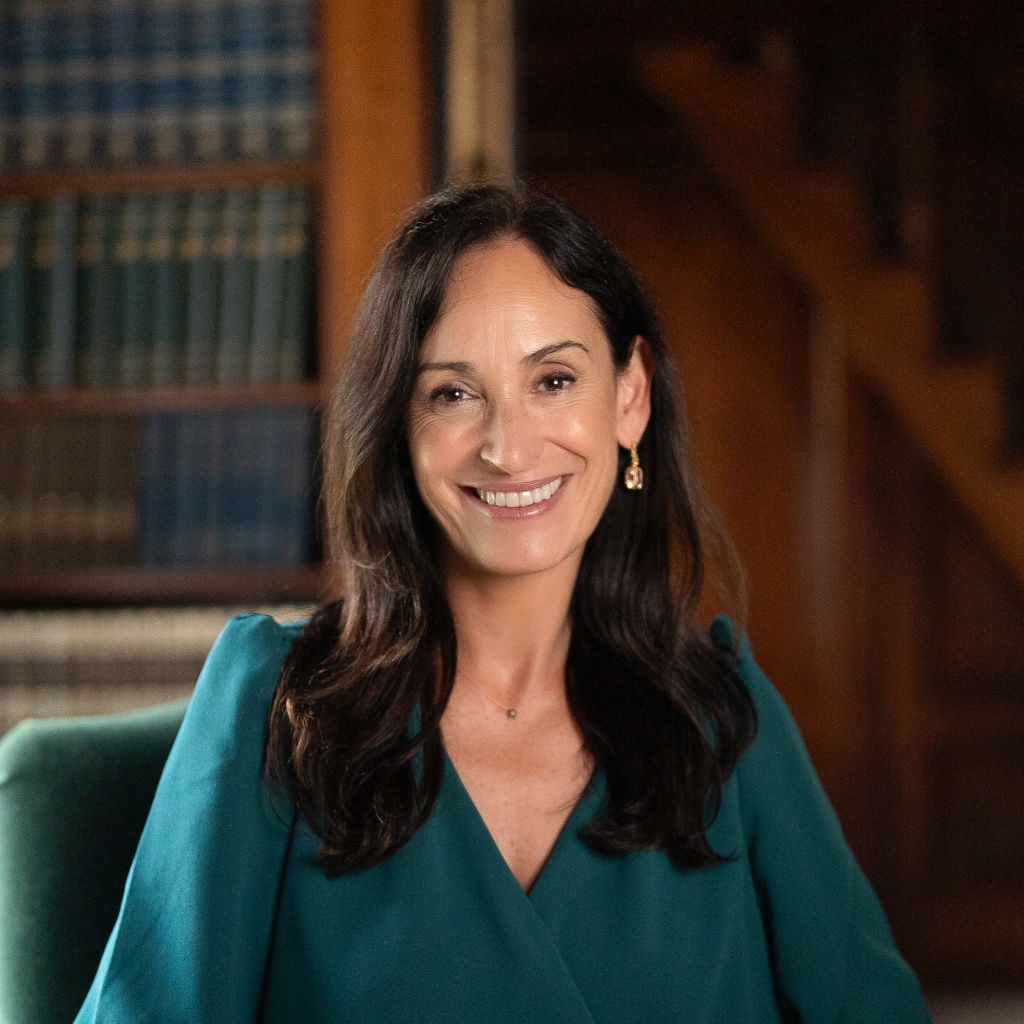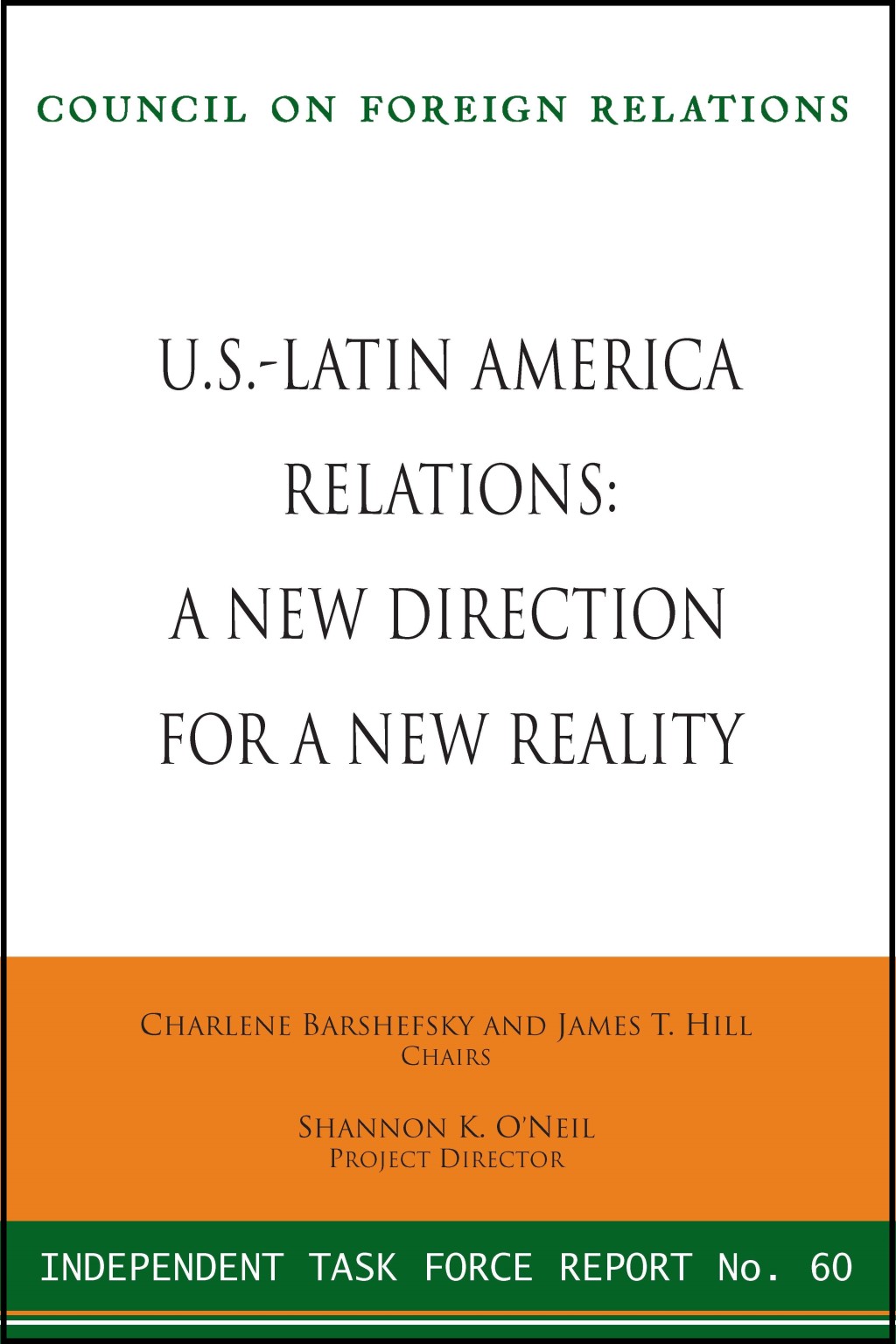Task Force Report No. #65
U.S.-Latin America Relations
A New Direction for a New Reality
- James T. HillCochair
- Charlene BarshefskyCochair
![]() Shannon K. O'NeilDirector
Shannon K. O'NeilDirector
What are Task Force Reports?
CFR sponsors Task Forces to assess issues of critical importance to U.S. foreign policy to reach bipartisan consensus on policy recommendations.
Who makes them?
Task Force members aim to reach a meaningful consensus on policy and are solely responsible for the content of their report.
Latin America has never mattered more for the United States.
The region is the largest foreign supplier of oil to the United States and a strong partner in the development of alternative fuels. It is the United States‘ fastest-growing trading partner, as well as its biggest supplier of illegal drugs. Latin America is also the largest source of U.S. immigrants, both documented and not. All of this reinforces deep U.S. ties with the region—strategic, economic, and cultural—but also deep concerns.
This report makes clear that the era of the United States as the dominant influence in Latin America is over. Countries in the region have not only grown stronger but have expanded relations with others, including China and India. U.S. attention has also focused elsewhere in recent years, particularly on challenges in the Middle East. The result is a region shaping its future far more than it shaped its past.
At the same time Latin America has made substantial progress, it also faces ongoing challenges. Democracy has spread, economies have opened, and populations have grown more mobile. But many countries have struggled to reduce poverty and inequality and to provide for public security.
The Council on Foreign Relations established an Independent Task Force to take stock of these changes and assess their consequences for U.S. policy toward Latin America. The Task Force finds that the long-standing focus on trade, democracy, and drugs, while still relevant, is inadequate. The Task Force recommends reframing policy around four critical areas—poverty and inequality, public security, migration, and energy security—that are of immediate concern to Latin America’s governments and citizens.
The Task Force urges that U.S. efforts to address these challenges be done in coordination with multilateral institutions, civil society organizations, governments, and local leaders. By focusing on areas of mutual concern, the United States and Latin American countries can develop a partnership that supports regional initiatives and the countries‘ own progress. Such a partnership would also promote U.S. objectives of fostering stability, prosperity, and democracy throughout the hemisphere.
Task Force Members
Charlene Barshefsky is senior international partner at Wilmer Cutler Pickering Hale and Dorr LLP (WilmerHale) in Washington, DC. She joined the firm after serving as the U.S. trade representative (USTR) from 1997 to 2001 and as acting and deputy USTR from 1993 to 1996. She serves on the boards of directors of American Express Company, the Estée Lauder Companies Inc., Intel Corporation, and Starwood Hotels & Resorts Worldwide, Inc. She also serves on the Board of the Council on Foreign Relations.
R. Rand Beers is currently president of the National Security Network and an adjunct lecturer on terrorism at the Kennedy School of Government at Harvard University. He most recently worked as the national security adviser for the Kerry-Edwards campaign. He served in four positions on the National Security Council (NSC) staff at the White House during four administrations. His functions included director for counterterrorism and counternarcotics, director for peacekeeping, and senior director for intelligence programs (1988–98), as well as assistant secretary of state for international narcotics and law enforcement affairs (1998–2002) and special assistant to the president and senior director for combating terrorism on the NSC staff (2002–2003).
Alberto R. Coll is professor of international law and director of the European legal studies program at the DePaul College of Law in Chicago. Before joining DePaul in 2005, he was chairman of the Strategic Research Department at the U.S. Naval War College in Newport, Rhode Island, where he also served for five years as dean of the Center for Naval Warfare Studies. From 1990 to 1993, Dr. Coll served as principal deputy assistant secretary of defense, overseeing the Defense Department’s policy, strategy, and budget in the areas of special operations forces and “low-intensity” conflict, including counterterrorism. For his work, he received the Secretary of Defense Medal for Outstanding Public Service.
Margaret E. Crahan is Kozmetsky distinguished professor and director of the Kozmetsky Center of Excellence in Global Finance at St. Edward’s University. From 1994 to 2008 she was the Dorothy Epstein professor at Hunter College and the Graduate Center of the City University of New York and from 1982 to 1994 she was the Henry R. Luce professor of religion, power and political process at Occidental College. She currently is vice president of the board of the Inter-American Institute of Human Rights. Dr. Crahan has done research on topics spanning the sixteenth through twentieth centuries and has published over one hundred articles and books.
Jose W. Fernandez is a partner and co-chairs the Latin America practice at Latham & Watkins LLP. For nearly three decades, his work has focused on Latin America, working on a wide variety of matters as the economies of the region have evolved. He has advised clients on financings, acquisitions, privatizations, securities offerings, and joint ventures across a number of Latin American countries. Mr. Fernandez serves on the board of directors of Dartmouth College, ACCION International, and the Council of the Americas, among others. He has been both chair of the ABA’s Inter-American Law Committee and chair of the Committee on Inter-American Affairs of the New York City Bar. He is currently co-chair of the Cross Border M&A and Joint Ventures Committee of the New York State Bar Association, and a member of the Latin America Advisory Council of the ABA.
Francis Fukuyama is the Bernard L. Schwartz professor of international political economy at the Paul H. Nitze School of Advanced International Studies (SAIS) at the Johns Hopkins University and the director of SAIS’s international development program. He is also chairman of the editorial board of a new magazine, the American Interest. Dr. Fukuyama was a member of the president’s Council on Bioethics from 2001 to 2005. He is a member of advisory boards for the National Endowment for Democracy, the Journal of Democracy, and the New America Foundation.
Peter Hakim is president of the Inter-American Dialogue, the leading U.S. center for policy analysis and exchange on Western Hemisphere affairs. He was a vice president of the Inter-American Foundation and worked for the Ford Foundation in both New York and Latin America. Mr. Hakim has taught at MIT and Columbia. He currently serves on boards and advisory committees for the Foundation of the Americas, World Bank, Inter-American Development Bank, Foreign Affairs en Español, Intellibridge Corporation, and Human Rights Watch.
James A. Harmon is chairman of Harmon & Co., a financial advisory firm organized in 2001, and chairman of the Caravel Fund (International) Ltd., an emerging markets fund. Mr. Harmon served as chairman, president, and CEO of the Export-Import Bank of the United States from 1997 to 2001. Prior to entering government services Mr. Harmon was chairman and CEO of the investment bank Wertheim Schroder. In 2004, Mr. Harmon was elected chairman of the World Resources Institute. Mr. Harmon is a senior adviser to the Rothschild Group and is a member of its European Advisory Council. Mr. Harmon is a member of the board of directors of Questar Corporation and the Alfa Bank (Moscow) Capital Partners Board. Mr. Harmon is also a member of the boards of the School of International and Public Affairs (SIPA) at Columbia University, Africare, and the Center for Global Development, and a trustee emeritus of Brown University and Barnard College.
John G. Heimann is the founding chairman of the Financial Stability Institute of the Bank for International Settlements and now serves as its senior adviser. He was a founding partner of Warburg Pincus & Co., and later the chairman of the Financial Institutions Group and member of the executive committee of Merrill Lynch & Co. Mr. Heimann has served as U.S. comptroller of the currency, superintendent of banks for New York State, and chairman of the Federal Deposit Insurance Corporation. He is a member of the Group of Thirty.
James T. Hill retired as a four-star general in the U.S. Army after having served since 1968. From 2002 to 2004 he was the combatant commander of the U.S. Southern Command, commanding all U.S. military operations and relationships in the Caribbean and Central and South America. In assignment related to Latin America, General Hill also served as deputy commanding general of the Multinational Force in Haiti (1994–95) and assistant deputy director for politico-military affairs on the Joint Staff (1992–94). Currently he is the president of the JT Hill Group, a strategic consulting firm located in Miami, Florida.
Donna Hrinak is the director for corporate and government affairs in Latin America for Kraft Foods Inc. She joined Kraft in 2006 after working with the international advisory firm McLarty Associates, where she was senior director. She also worked as the co-chair of the International Trade and Competition practice group at the law firm of Steel Hector & Davis. From 1974 to 2004, Ambassador Hrinak served as a U.S. Foreign Service officer. She completed her Foreign Service career as ambassador to Brazil and also served as ambassador to Venezuela, Bolivia, and the Dominican Republic and as deputy assistant secretary of state for Mexico and the Caribbean. In 1994, she served as coordinator for policy for the Miami Summit of the Americas. In addition to her Foreign Service assignments, Hrinak has worked in the office of Representative Patricia Schroeder on a fellowship from the American Political Science Association. Hrinak serves on the boards of the Inter-American Dialogue and the Pan American Development Foundation and on the board of counselors of McLarty Associates.
James V. Kimsey created America Online, Inc., and currently serves as chairman emeritus. In 1996, he launched the Kimsey Foundation, which provides grants that benefit the Washington, DC, community in areas from arts to education. Mr. Kimsey received presidential appointments to the Kennedy Center board of trustees and the West Point board of visitors. In 2001, Secretary of State Colin Powell named Mr. Kimsey as chairman of the International Commission on Missing Persons. Mr. Kimsey also serves as chairman emeritus of Refugees International and as a member of the board of the International Crisis Group.
Jim Kolbe served in the United States House of Representatives from 1985 to 2007, representing the Tucson area. A Republican, Mr. Kolbe served for twenty years on the House Appropriations Committee. He was also chairman of the Treasury, Post Office, and Related Agencies subcommittee for four years, and for the last six years in Congress, he chaired the Foreign Operations, Export Financing, and Related Agencies subcommittee. Congressman Kolbe is currently a senior adviser at McLarty Associates and serves as a senior transatlantic fellow for the German Marshall Fund of the United States and as an adjunct professor in the College of Business at the University of Arizona.
Kellie Meiman leads the Brazil/Southern Cone practice of the international advisory firm McLarty Associates. She worked most recently at the Office of the U.S. Trade Representative (USTR) as director for Mercosur and the Southern Cone, where she had primary responsibility for Brazil, Argentina, Chile, Paraguay, and Uruguay. Prior to her work at USTR, Ms. Meiman served as a Foreign Service officer with the U.S. Department of State.
Shannon K. O’Neil is the fellow for Latin America studies at the Council on Foreign Relations. Before joining the Council, she was a justice, welfare, and economics fellow and an executive committee member and graduate associate at the Weatherhead Center for International Affairs at Harvard University. She was also a Fulbright Scholar in Mexico and Argentina. Prior to her academic work, Dr. O’Neil worked in the private sector as an equity analyst at Indosuez Capital Latin America and Credit Lyonnais Securities.
María Otero is president and CEO of ACCION International. Ms. Otero chairs the board of ACCION Investments, co-chairs the Microenterprise Coalition, and serves on the boards of directors of three regulated microfinance institutions in Latin America. She chaired the board of Bread for the World from 1992 to 1997. In 1994, President Clinton appointed Ms. Otero to serve as chair of the board of directors of the Inter-American Foundation, a position she held until January 2000. She has also served in an advisory capacity to the World Bank’s Consultative Group to Assist the Poorest (CGAP).
Arturo C. Porzecanski is a professor of international finance and distinguished economist-in-residence at American University’s School of International Service, having previously taught at Columbia University, New York University, and Williams College. He is a member of the board of directors of the Tinker Foundation and of the Washington Office on Latin America. Prior to his current academic career, Dr. Porzecanski worked for nearly three decades as an international economist on Wall Street, starting out with J.P. Morgan in the 1970s, where he served as economic adviser on Latin America. He later rose to become chief economist for emerging markets at several financial institutions, the last of which was the European banking group ABN AMRO.
David J. Rothkopf is president and chief executive officer of Garten Rothkopf, a Washington, DC–based international advisory firm serving the investment, corporate, and government communities. He is also a visiting scholar at the Carnegie Endowment for International Peace, where he is chairman of the Carnegie Economic Strategy Roundtable. He is author of Running the World: The Inside Story of the National Security Council and the Architects of American Power; The Superclass: The Global Power Elite and the World They are Making; and the forthcoming Power, Inc.: The Untold Story of the Global Power Struggle Between Companies, Countries and Their Leaders. He served as deputy undersecretary of commerce for international trade policy development and later as acting undersecretary of commerce for international trade during the Clinton administration. Rothkopf is a member of the advisory boards of the U.S. Institute of Peace, the Center for Global Development, and the Johns Hopkins/Bloomberg School of Public Health, and he is an adjunct professor of international affairs at Columbia University.
Julia E. Sweig served as senior adviser for this Task Force report. She is the Nelson and David Rockefeller senior fellow for Latin America studies and director of Latin America studies at the Council on Foreign Relations (CFR). Dr. Sweig is the author of Friendly Fire: Losing Friends and Making Enemies in the Anti-American Century and Inside the Cuban Revolution, as well as numerous scholarly articles, opinion pieces, congressional testimony, and CFR reports on Cuba, Venezuela, the Andes, Latin America, and American foreign policy. She serves on the editorial board of Foreign Affairs en Español and as a consultant on Latin American affairs for the Aspen Institute.







